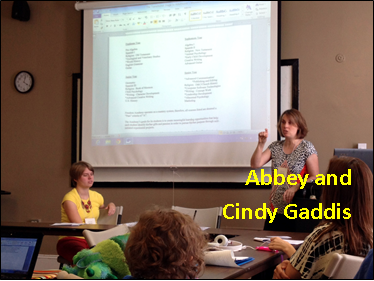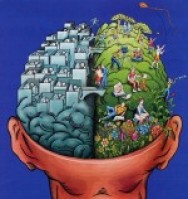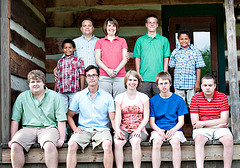Two of my children who have attended university partnered with me to present a workshop at some homeschooling conferences on the topic of unschoolers and college. I gave them some common questions to answer in preparation. One was what traits do they feel helped them be successful at college. They both answered their questions on their own time, separate from one another, and they both gave the same answer: a strong work ethic and a love of learning.
In unschooling circles, we often talk about how this way of learning promotes a love of learning. We speak of developing gifts, strengths, and passions. Yet, as it pertains to a work ethic, consistently, parents will ask the question, “But how do we get our children to want to do things that aren’t interesting or exciting, but needs to be done?” Those in unschooling circles will often filter the answer to this question through a child’s or person’s love of learning: “If it means something to them, or they’re passionate about it, they’ll do the less interesting parts, too.” But, is that really all there is to it? Not in my experience of raising seven children, in which parenting and learning had to be presented in three dramatically different ways. (My first three were traditional right-brained learners, my next two needed high structure as initially non-verbal people with autism, and my last two adopted boys required a psychological firmness due to high energy and culturally different needs.)
First, let’s talk about the difference between a love of learning and a work ethic. My oldest is a great example of someone who naturally initiated tons of projects that engaged him for hours, days, weeks, and months. This young child always  was immersed in some creative endeavor. For things that interested him, he was a passionate learner. A work ethic, on the other hand, didn’t come to him naturally. Some unschoolers would say that his commitment to his projects is a work ethic. In retrospect, I would call it a love of learning. Or even passion. He has great passion. To me, a work ethic is a drive or commitment toward a goal. My oldest son didn’t have a goal in these projects. He was enjoying the process of engagement in something he loved. Very different.
was immersed in some creative endeavor. For things that interested him, he was a passionate learner. A work ethic, on the other hand, didn’t come to him naturally. Some unschoolers would say that his commitment to his projects is a work ethic. In retrospect, I would call it a love of learning. Or even passion. He has great passion. To me, a work ethic is a drive or commitment toward a goal. My oldest son didn’t have a goal in these projects. He was enjoying the process of engagement in something he loved. Very different.
When I look up the definition of a work ethic, it states that it’s a principle that hard work is intrinsically virtuous or worthy of reward. What comes up over and over again is the connection to a moral code of conduct associated with the Protestant Work Ethic. In other words, a work ethic is considered a Godly trait. For its negative connotation, I think it can get linked to blind obedience, or do as I say not as I do attitudes, or even maybe the old pious outlook. For its positive connotation, I think it can get linked to the American Dream (come here with nothing, work hard, and get what you want), an entrepreneurial spirit (be your own boss; find your own way), and being a contributing member of value (whether to a family, business, or community).
For me, a work ethic means being responsible. The story that comes to mind is  The Ant and the Grasshopper. Now, mind you, I’m not an all or nothing type of person. I believe in balance. I believe in individualization. For instance, think of cleaning house or one’s bedroom as a work that should be done. Some of us like to be neat, and others of us like to be lived in. I’m the lived in type. I have several other children who are as well. I have a few that like neatness. In fact, speaking of this very subject, my electronics son (who lives with autism), when being spoken of about his bathroom had declared from his bedroom, “Haven’t you heard of hoarders?” He makes me laugh every day! Without a work ethic, some of my cluttered types might very well end up in that direction.
The Ant and the Grasshopper. Now, mind you, I’m not an all or nothing type of person. I believe in balance. I believe in individualization. For instance, think of cleaning house or one’s bedroom as a work that should be done. Some of us like to be neat, and others of us like to be lived in. I’m the lived in type. I have several other children who are as well. I have a few that like neatness. In fact, speaking of this very subject, my electronics son (who lives with autism), when being spoken of about his bathroom had declared from his bedroom, “Haven’t you heard of hoarders?” He makes me laugh every day! Without a work ethic, some of my cluttered types might very well end up in that direction.
So, how did I develop a strong work ethic in my children? The same way I helped them develop a love of learning: by providing a well-matched environment while understanding learning stages. Do we not agree that we can ruin a love of learning? I’ve heard many stories, whether it’s the mismatched environment of public school or the mismatched learning time frame in a homeschool. A work ethic is the same thing. Except one thing. I believe our advanced technological state of being has changed the “naturalness” of developing a work ethic.
When we think of pioneers, or the times depicted in Little House on the Prairie or the times of The Waltons, those were eras that required working hands from 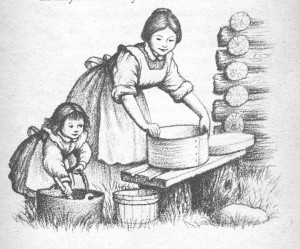 all members of the family. To spend time with a parent meant working alongside them. There were no conveniences that afforded idleness. It was meaningful work by its very nature. And take a look at what entertainment consisted of … active outdoors family time. There were no screens. Some people lament about the overall disrespect of our young today. I have to wonder if it’s a direct correlation to the idea that they are no longer needed for family functioning. No matter what we create for them to do in the form of chores or school, they know it’s optional. There is enough time in the day for parents to do it all, even if that means no down time for us.
all members of the family. To spend time with a parent meant working alongside them. There were no conveniences that afforded idleness. It was meaningful work by its very nature. And take a look at what entertainment consisted of … active outdoors family time. There were no screens. Some people lament about the overall disrespect of our young today. I have to wonder if it’s a direct correlation to the idea that they are no longer needed for family functioning. No matter what we create for them to do in the form of chores or school, they know it’s optional. There is enough time in the day for parents to do it all, even if that means no down time for us.
What can we do to develop a work ethic in our children, then? Farming families still engage their children in meaningful work. Raymond Moore, a long-time homeschooling parent and advocate, encouraged three important components for a homeschooling family: address the heart, head, and hands. He was a huge proponent for what he called “cottage industries,” or home businesses the children could work in. But, what about the majority of us who don’t have farms or cottage industries? What then? That’s why so many turn to chores and school as a child’s “work.” I’ve already shared the difficulty with chores in our technological world. The problem with school is that, though it can be important for one’s future, it doesn’t have immediate impact.
But chores and formal schooling is what I have to work with that does have contributing value outside of a farming or home business. To be effective, however, the stages of natural development need to be engaged. Let’s start off with chores. To those who are neat people and those who are lived in types, I believe bringing chores to the children will look different. I can only share the lived in type format that seems to have worked okay for our family. Before the age of 11 to 13, the brain development of a child is more me-centric. They can 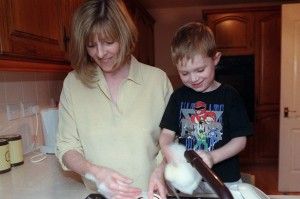 only see what’s right in front of them as it pertains to themselves. If you make them do things, they feel like, “Why are they doing this to me?” So, chores were best done together as a family. Let’s all do this together, which allows for us to help them learn how to do things, and as they get older, be able to contribute more meaningfully as an independent worker, alongside everyone else. The reason I say that neat people may differ from lived in people is probably the frequency in which cleaning occurs, and the intensity. We were pretty laid back. I think as long as everyone helps together, and expectations are realistic for each child’s development, differing levels of cleaning together can occur without issues…I assume.
only see what’s right in front of them as it pertains to themselves. If you make them do things, they feel like, “Why are they doing this to me?” So, chores were best done together as a family. Let’s all do this together, which allows for us to help them learn how to do things, and as they get older, be able to contribute more meaningfully as an independent worker, alongside everyone else. The reason I say that neat people may differ from lived in people is probably the frequency in which cleaning occurs, and the intensity. We were pretty laid back. I think as long as everyone helps together, and expectations are realistic for each child’s development, differing levels of cleaning together can occur without issues…I assume.
For the stage of learning of between 5 and 11 years old, I call this the Finding Passion stage. It’s also what I call Childhood. This is when a child develops their love of learning, and consequently, each of my children were able to discover their gifts and interests, and ultimately, their passion. Like chores, there was little to no formal independent instruction like you find in school. Instead, it was more of an immersion setting where we discovered things together and alongside each other, each pursing what excited him most.
During the 11 to 13 year developmental stage, what I call a brain shift occurs. I wrote about it as it pertains to middle school in a previous post. This is when a  child suddenly realizes he is a small fish in a big pond. A young person now begins to understand that he and others have impact on what is going on around them. They can suddenly see themselves as others see them, as a person with strengths and weaknesses, as a person who can impact the world and is impacted by the world, as a person who needs to find their place in the world as a contributing member.
child suddenly realizes he is a small fish in a big pond. A young person now begins to understand that he and others have impact on what is going on around them. They can suddenly see themselves as others see them, as a person with strengths and weaknesses, as a person who can impact the world and is impacted by the world, as a person who needs to find their place in the world as a contributing member.
For the stage of learning of between 11 and 17 years old, I call this the Seeking Purpose stage. It’s also what I call Young Adulthood. In other words, they are beginning to become adults, though new at it. Unlike watching a young mother cat give birth and naturally know what to do, a young human learns through modeling. We don’t automatically know how to become responsible adults. We need role models. As parents, we have the privilege of being one of these important adult role models in our child’s life.
One of the first things I do is to expect adult behaviors to be developed, but being as they are young adults, I am there to patiently show them the way. I do that 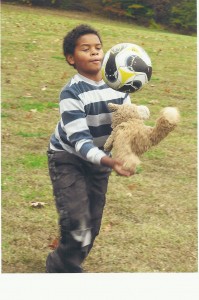 through modeling (example) and I do that through a lot of discussion. It’s actually quite exciting because they are fully able to grasp these concepts, including a work ethic. Because this is a transition stage between childhood and adulthood, it’s natural to see your child vacillate between the two throughout the 11 to 13 year stage. As I discuss in my middle school post, because it’s a new stage, they need just as much support as our 5 to 7 year olds need as young children. It’s simply for a different stage, but equally challenging for the stage.
through modeling (example) and I do that through a lot of discussion. It’s actually quite exciting because they are fully able to grasp these concepts, including a work ethic. Because this is a transition stage between childhood and adulthood, it’s natural to see your child vacillate between the two throughout the 11 to 13 year stage. As I discuss in my middle school post, because it’s a new stage, they need just as much support as our 5 to 7 year olds need as young children. It’s simply for a different stage, but equally challenging for the stage.
I use formal learning to accomplish this usually starting between 11 and 13 years old. I work alongside them using only subjects that are areas of low or non-interest up until that point (it’s a way of “filling in the gaps” generally speaking). I never dabble in formal learning with their passion. This is a model, not a system of learning. In fact, what they learn with these assignments is very little as it pertains to the actual material. But it has served to model a work ethic very well. In fact, in the 14 to 16 year stage, each of my children have soared in their passion area in creating goals and future aspirations because of this model.
What am I modeling? Having a long-term goal, breaking things down into short-term goals, sticking to something consistently even when it’s a bit boring, showing up even if you don’t feel like it, experiencing the big picture of accomplishing something over time, learning new skills to meet a goal, improving even in weak areas with persistence, and so much more. In the last year of this stage, and as each young person gets the hang of doing the work alongside me, we start to figure out a work structure to encourage becoming independent with the work. It could be workboxes, folders, assignment sheets, schedules, etc. The idea is to start out with full supports and modeling and to end with a young person who is capable of knowing how to set and reach goals independently.
During the 14 to 16 year stage of development, I found my children started partnering with me on formal goals. They often initiated career-based projects 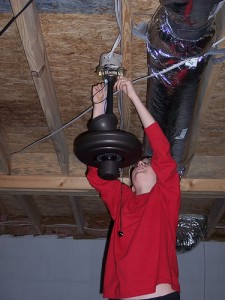 within their area of passion, engaging in it for 6 to 8 hours a day, seeking counsel from time to time. They discussed with me what formal academics were useful and which were not and what they wanted to continue with or drop based on those discussions. They exhibited a newfound maturity in taking responsibility for their lives that day, and for the future. They were starting to stand on their own two feet, with full understanding about how to do so, and that a certain level of big picture thinking about at least the near future needed to be considered and planned for. I helped a lot with balance at that point. By 17, my children were fairly independent, so when each left the home for various pursuits at around 19, it was quite seamless.
within their area of passion, engaging in it for 6 to 8 hours a day, seeking counsel from time to time. They discussed with me what formal academics were useful and which were not and what they wanted to continue with or drop based on those discussions. They exhibited a newfound maturity in taking responsibility for their lives that day, and for the future. They were starting to stand on their own two feet, with full understanding about how to do so, and that a certain level of big picture thinking about at least the near future needed to be considered and planned for. I helped a lot with balance at that point. By 17, my children were fairly independent, so when each left the home for various pursuits at around 19, it was quite seamless.
What thoughts and experiences do you have with the development of a strong work ethic?

